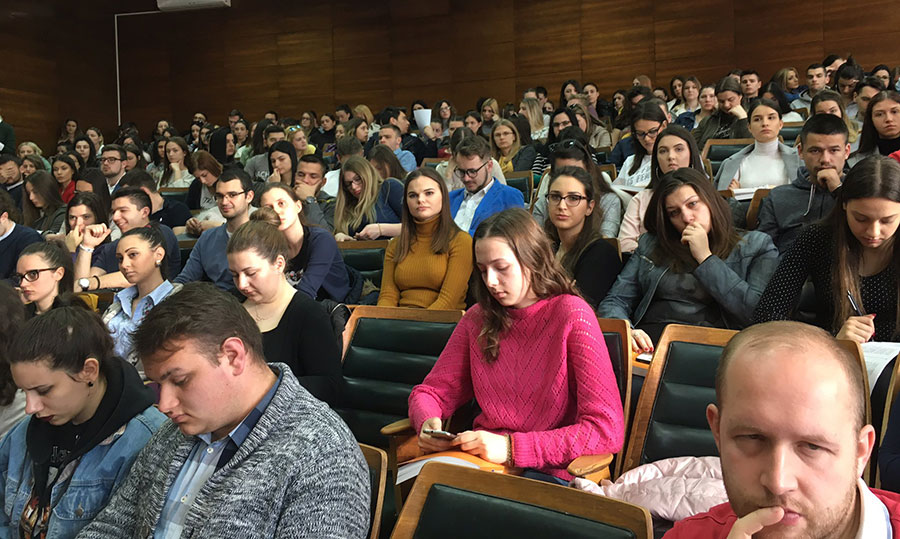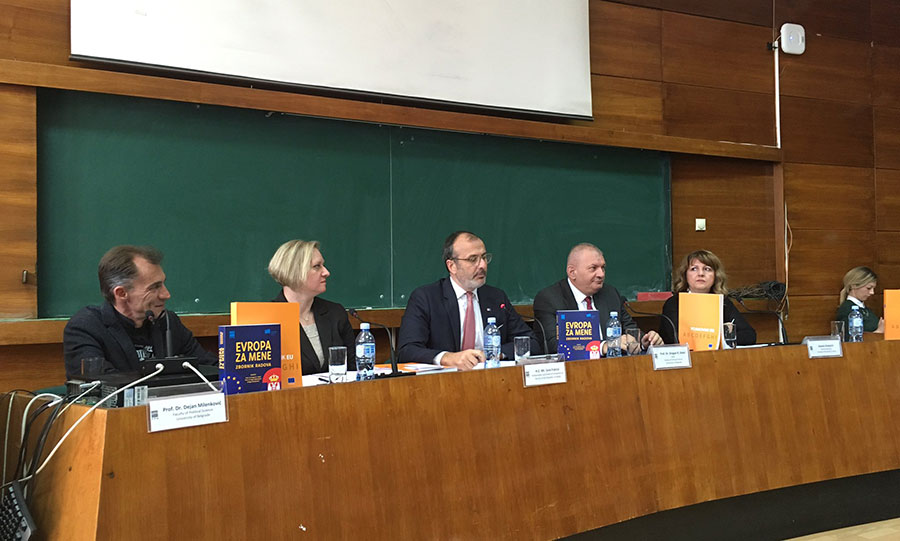Head of the EU Delegation to Serbia Ambassador Sem Fabrizi took part in a debate with students of the Faculty of Political Sciences in Belgrade on the occasion of tenth anniversary of Serbia’s EU membership bid. The debate was hosted by the Faculty and the European Movement in Serbia. The occasion was also seized to present two EU-related publication Europe4Me and EU Glossary.
I would like to hear what students think is important about the European integration. I believe what’s important is better education, employment opportunities and higher quality of life, traveling, but above all, the fact that the EU is a space of peace and democracy, Ambassador Fabrizi said at the beginning of the debate.
“We, as the EU Delegation, strive to support students and education in Serbia. We have numerous projects in this regard and offer information and publications,“ Fabrizi said.
Noting that the government is not the only one that enters the Union, but takes the whole of country and society with it, he said, adding that the quality must come before speed because the EU itself has to undergo reform and is doing it on everyday basis. Serbia also need to undertake substantial reform. He said Serbia and Montenegro have made more progress than other candidates. Yet, apart from benefits the EU membership brings, it also carries certain responsibilities.
“Once Serbia becomes a member of the EU, the process of integration will be far from over. That is when work begins. Serbia should then help the Union in tackling financial and migrant crises. However, we in the EU have already put in place mechanisms to address those challenges.”

Photo: Evropski pokret
When it comes to Belgrade-Pristina relations, Fabrizi says he’s cautiously optimistic. The final result must come in the form of a binding agreement in line with the international law, he said. The dynamics of the accession process was also discussed by President of the European Movement in Serbia Suzana Grubjesic.
“Our ride to the EU is bumpy.” If we manage to get into the EU in 2025, a quarter century will have passed since the democratic changes took place in Serbia. Opening two chapters at a time is not a tempo that will take us to the EU by 2025, but if we overcome the biggest obstacle – and normalise our relations with Pristina – I hope the tempo will be sped up,” Grubjesic said.
She noted that public opinion polls have shown that there is a lack of information about the accession process. This causes support for the EU membership to fall among citizens, she said, adding that it is necessary to work on raising awareness about the accession process.
The debate also served as an opportunity to present two publications that will help students understand the European integration process.
Europe4Me is a collection of papers written following a series of debates organised within the Europe4Me project. The papers deal with topics that are of interest to citizens in the accession process. It comprises 59 texts from various experts, professors of the Belgrade University and other universities, prominent experts and researchers in over 15 fields of social life. It is aimed at students, researchers and everyone who is interested in the process of Serbia’s accession and the effect of reform. The collection of texts was made possible thanks to EU’s financial assistance.
EU Glossary represents a unique resource to acquire more thorough information about the EU and understand its institutions and policies, historical figures, development trends and European acquis as well as the Serbia-EU relations within the negotiating process. The Glossary contains 251 entries and terms and is authored by Serbian experts who have worked on it meticulously for nearly two years. It is intended for students, researchers, public servants and the press, as well as all other citizens interested in the European integration process and the way the EU works. It is available in both print and electronic format.




